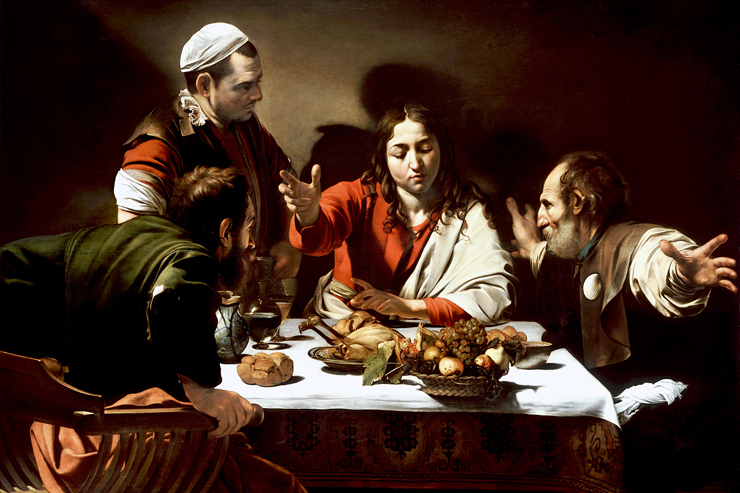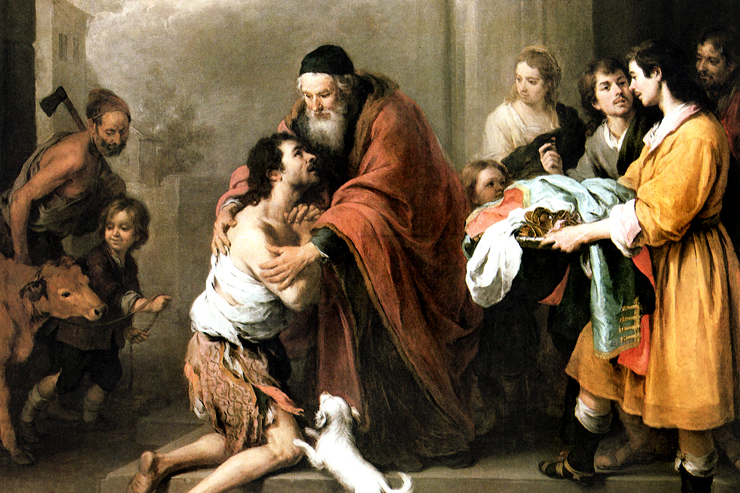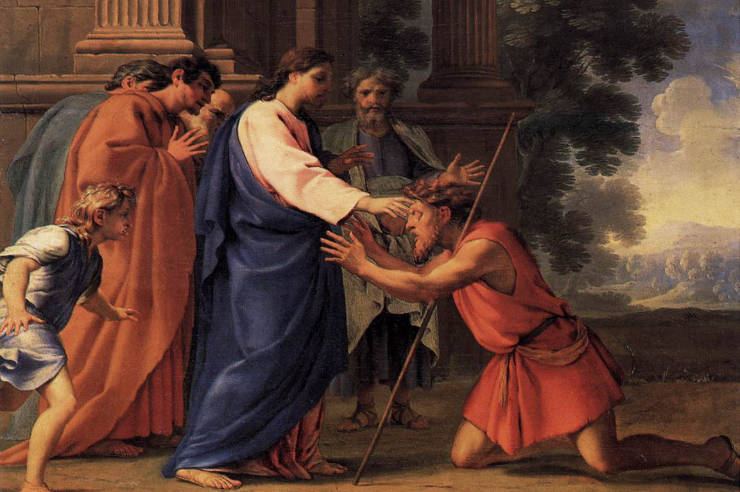
“Supper at Emmaus” (detail) by Caravaggio
What Life’s All About
When God created Adam and Eve, He gave them sanctifying grace, that is, they were able to partake in the Divine Nature—they had a share of the Divine Life in their souls. They had no right to this grace; it was freely given them by God. They also were granted what is referred to as the preternatural gifts of bodily immortality, integrity and infused knowledge.
We all know that Adam and Eve lost these gifts due to their sin and therefore, we lost them too. After all, we could not inherit from them that which they no longer possessed. It is through sin that death entered the world. So it is now our condition that we will one day die—we lost the first preternatural gift.
The loss of the second preternatural gift, integrity, has resulted in our inclination to sin; what we now refer to as concupiscence. There are two types of sin.
The first is Original Sin which we inherit by generation; by the fact that we were conceived by our parents, who were conceived by their parents… in a line that stretches all the way back to Adam and Eve. Original sin will not directly send anyone to Hell, but it will keep us from Heaven unless we are cleansed from it.
The second type of sin is Actual (or personal) Sin which is sin we personally commit either by acts of commission or acts of omission. The Church has traditionally taught that there exist Seven Deadly (or Capital) Sins. “Vices can be classified according to the virtues they oppose, or also be linked to the capital sins which Christian experience has distinguished, following St. John Cassian and St. Gregory the Great. They are called “capital” because they engender other sins, other vices. They are pride, avarice, envy, wrath, lust, gluttony, and sloth…” (CCC 1866). Personal Sin can be mortal, that is, it can deprive us of the free gift of Heaven and merit for us Hell.
Losing Sight of the Meaning of Life
The loss of the third preternatural gift, infused knowledge, as bad as the loss of the first two gifts was, should not be neglected in our efforts to grow in the spiritual life.
The Church teaches that mankind, prior to Original Sin, possessed a knowledge that was infused by God and not the result of personal study or experience. This infused knowledge is usually said to cover three categories of knowledge: knowledge of God and His perfections, knowledge of the moral law and right living, and knowledge of the physical universe, both material and spiritual.
From a practical standpoint, this meant that pre-Fall, Adam and Eve knew the meaning of life—they knew who God is, who they were, their relationship with God, why they were on Earth, where they were to go (Heaven) and how to get there.
I sometimes think that it is the absence of this knowledge, despite God’s Divine Revelation lovingly given to us over the centuries, which seems to allow the Seven Deadly Sins to give rise to so much personal sin in our lives. Our priorities and the self-absorption from which they derive, tells me this is so. Of course this is our failure, not the Lord’s. We are quick to acknowledge in word that Jesus is our Savior, but not so quick to acknowledge in action that we are sinners in need of a savior.
The reason God became man was to redeem us and be our savior. We are sinners who have been redeemed and through our faith and baptism, we were restored to life in God. Jesus also instituted the Sacrament of Reconciliation so that when we again sin mortally, we would have access again to His grace of salvation.
Lazarus and the Rich Man
In the Gospel of Luke (Luke 16:19-31), Jesus tells us of Lazarus and the Rich Man, we see an example of how our attitudes and behaviors can be upside down and inside out. The description of the rich man is meant to show us that he possessed great wealth and enjoyed the world’s idea of success. Quite the opposite for Lazarus, covered with sores and weighed down by poverty and helplessness; Lazarus would not have been seen to be successful in the eyes of the world.
It is important to note that Jesus does not criticize the wealth of the rich man; rather, he shows us that it is what the rich man failed to do for Lazarus that merited him condemnation, maybe because he had been blinded by his wealth.
Do We Know Who We Are?
The first of the Seven Deadly Sins is pride. It is this pride that turns our concerns inward to ourselves in a worldly fashion. Doesn’t it seem that many in the world today seem to be like the rich man, who is more concerned with his own wants than the needs of others? What does our behavior tell us about our own attitude?
Humility, which is the virtue opposed by pride, opens us up to God and to the care of others. So we should be open to an honest self-assessment. Do we follow the model of Jesus, Who in humility emptied Himself of His reliance on His Divinity? Or do we follow the model of Satan and the rich man who said in pride, “I will not serve”? This can be a very painful question to pose, but it is one that is necessary if we truly want to deepen our relationship with God and attain heaven.
Three Practical Ideas For Spiritual Growth
1. Avail yourself of the sacramental life of the Church—If you do not now make a regular confession in the Sacrament of Reconciliation, get in the habit of doing so. And prepare yourself by examining your actions and attitudes daily. Be sure to ask others what they think of you and thank them for their honesty. Attend Holy Mass frequently; more often than required and worthily receive Holy Communion.
2. Spend more time in quality, humble prayer—Prayer, offered in humility and love of God, is essential to the spiritual life. Ask God to show you how He sees you. Your prayer should be urgent, persistent, expectant and faithful. Like many of you, my daily schedule is full, but we must give to God more than our left-over time. If you have to start with small steps, that is okay… good habits grow.
3. Find ways to serve others—Seek to conquer pride by thinking of others first. If we learn anything from the story of Lazarus and the Rich Man, it is that our time on earth will come to an end, and that end might come quite unexpectedly. If we have lived in this life according to the world’s measure of success, we will find ourselves to be failures in the life to come and at that point it is too late to change. You can see that in the after-life, the Rich Man only sees his own wants and needs and treats Father Abraham and Lazarus as he would his servants. Father Abraham tells the Rich Man that it is too late for him.
Our service to and care for others should derive from a love for God and reflect a new way of life and that begins in the home. Start there, but if you are looking for a tangible way to get started even beyond the home, why not look at the ministries that are available in the parish? Find a parish ministry where your talents and time could be used; sign up and become involved. Begin today to replace self-centered habits with those that show your love of God through service to others.
Into the Deep…
Deacon Bickerstaff is available to speak at your parish or event. Be sure to check out his Speaker Page to learn more. Into the Deep is a regular feature of the The Integrated Catholic Life™.
Come and Join me on Twitter!














